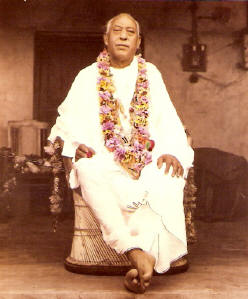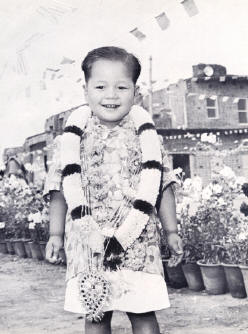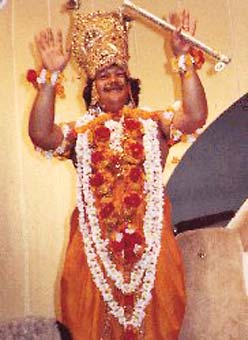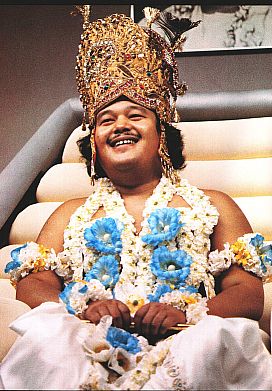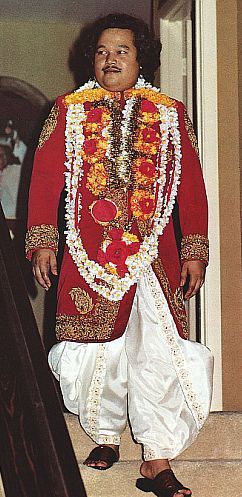Prem Rawat's Claim to Spiritual Ascendency
Although Prem Rawat and his supporting organisations now deny the religious content of Rawat's earlier teaching, there has been no attempt by Rawat to renounce the process of religious ascendancy that saw him titled "Guru Maharaj Ji." Indeed without his inheritance of his religious ascendancy it seems certain that Prem Rawat would have had no ability to create the basis of his success as the teenage "Perfect Master" of Divine Light Mission and without that devoted following it is certain that Prem Rawat would have had no success as a secular 'inspirational speaker' of "Elan Vital" nor as the internationally respected Master of Peace of "Words Of Peace Global" he is trying to become.
The Teacher
Since the age of eight, Prem Rawat has claimed that he can show every human being the peace that "you are looking for, within yourself", this peace being accessed via initiation into the practice of 'Knowledge'. In the early years of his 'mission' Prem Rawat employed the system of initiation developed by his father, in which the ritualistic transmission of meditation techniques was carried out by intermediaries who were initially supposed to be advanced "great souls" called mahatmas, and later referred to as 'initiators' and were chosen from Rawat's most dedicated Western devotees and were believed to have some spiritual cachet and finally called 'instructors' and were no longer expected to have extra spiritual attainments.
Currently Prem Rawat maintains an exclusive right to show the techniques of meditation and even forbids his followers from talking in any depth about 'Knowledge'. To learn about the meditation, interested people are instructed to watch videos of Prem Rawat speaking. The system is one in which there is a single teacher, Prem Rawat, and all others are students, to whom Prem Rawat ministers in didactic fashion.
The Perfect Master: an ideology
By what authority does Prem Rawat claim qualification as a 'teacher', why is he the sole source of 'learning' and what special understanding did he possess at age eight that entitled him to embark upon the role of 'Guru'?
When Prem Rawat was eight years old , his father, self-proclaimed 'Perfect Master' Hans Ram Singh Rawat, known as Shri Hans Ji Maharaj, died. Despite general expectations that the eldest Rawat son, Bal Bhagwan Ji would become the new master, and despite much debate within the Rawat family and the senior followers of Shri Hans, the mantle of "Perfect Master" or 'Satguru' was passed by some process of agreement to the youngest son, Prem Pal Singh Rawat then known as Balyogeshwar (born king of the yogis) or Sant Ji in the family circle.
Throughout the seventies and early eighties followers of the then Guru Maharaj Ji, were taught that there is always a Perfect Master walking the Earth. This Perfect Master is supposed to possess some special powers and is even considered to be God in human form. The reason for the Perfect Master's presence on Earth is to reveal the sacred 'Knowledge' to human kind and thus offer salvation from a presupposed human condition of suffering, a condition often believed to exist by the young. Furthermore, all the past Perfect Masters are alive now and all their powers are united in the one person and power, Prem Rawat and a new world is coming:
"Jesus is living now, Ram is living now, Krishna is living now, Buddha is living now, but they all have been united. All their powers have been united into one very, very, very, very powerful power. And when this power spreads its hand, you know, something is going to happen. All the things that are going on wrong in this world are going to be abolished." - The Sayings of Guru Maharaj Ji
Prem Rawat as Guru Maharaj Ji was claimed to be the Perfect Master of the time. Prem Rawat explicitly taught in his Perfect Master ideology that such great religious leaders and icons as Jesus Christ, Krishna and Buddha were also Perfect Masters and each in their own time revealed the same 'Knowledge' as that taught by Prem Rawat. From this point of view, the Perfect Master and his 'Knowledge' are considered in themselves not to be a religion but rather the source of and inspiration for all true religion.
Amongst the followers of Prem Rawat the ideology was further developed to incorporate a critique of established religions which were judged as mere 'beliefs', lacking the one true motivating spiritual 'experience':
- that it is possible to 'know God' rather than just believe in God
- that belief is inferior to experience
- that religion is merely concerned with belief
These propositions provide the rationale behind Prem Rawat's much repeated claim that he teaches an experience and not a set of beliefs or a religion.
Once these filters of ideology and proposition are made explicit it becomes easier to understand how Prem Rawat holds such complete control over all aspects of his teachings, the meditation and the organisations that support him.
Although Prem Rawat has publicly distanced himself from the Perfect Master ideology, understanding that ideology and the contexts in which it was previously presented is essential to answering the questions about Prem Rawat's qualification as a 'teacher', why is he the sole source of 'learning' and what special understanding he possessed on his assumption of the mantle of Satguru?
The Perfect Master ideology is by no means exclusively a Prem Rawat conception, it is common to many Indian belief systems and to New Age style beliefs in the west and was given some intellectual credibility by Aldous Huxley in his book "The Perennial Philosphy." It is essentially a syncretic, and by allusion at least, mystical concept. The powers of the Perfect Master are rarely specified and although the 'living master' may be ascribed many fantastical qualities the process of transmission of his 'teaching' always remains vague. In this respect Prem Rawat's story is typical of other Perfect Master ideologies.
To understand how the Perfect Master ideology provided Prem Rawat with his initial qualification as a teacher and how it continues to provide him with the authority to lead his followers it is useful to begin by asking 'What exactly happened to Rawat at age eight when his father died? For instance did some magical or divine power enter his body? A belief that this was literally true was widely held by both Indian and Western followers in the 1970s and Prem Rawat did nothing to dispel this belief. In fact, he told and retold a well-rehearsed story detailing the process and providing unusual and supernatural details including receiving instructions from the resurrected body of his father. It may be best just to ask 'What exactly did Rawat say happened to him at age eight when his father died? A further compounding of the view of Prem Rawat's specialness is that the 'Knowledge' was considered to be intrinsically bound with Prem Rawat's person. He insisted upon this throughout his career.
This is the Knowledge that Jesus Christ gave, that Guru Nanak gave, that Krishna gave, that Ram gave, that Mohammed gave. And I am giving it. Supreme Knowledge. It is sacred. Top sacred! And it dwells within all of us. All human beings. And we are unable to know it without the help of the true Master. - Prem Rawat, August 11 1971
Because without Guru Maharaj Ji's Grace, you cannot understand Knowledge. - Prem Rawat, January 7 1978
"you can experience the joy that is inside of you. And that transformation is not possible without Knowledge, and Knowledge is not possible without the Master. - Prem Rawat, Long Beach, 5th December, 1997
Whatever actually happened to Prem Rawat following his father's death, from the perspective of his followers and especially in relation to the authority that Prem Rawat holds over them, it is enough to note that many believed, and indeed many still believe, that Prem Rawat was divinely incarnated, manifested and he is the embodiment of the formless Creator in a human form.
Krishna and Hinduism: an abiding reference
With the inception in 2002 of The Prem Rawat Foundation website as the primary presentation of Prem Rawat's public image, the grounds seem to have been set for a total break with past imagery and Prem Rawat's transformation from Guru to 'inspirational speaker' made complete. However Prem Rawat the "inspirational teacher" continues to make reference in his speeches to supposed past Perfect Masters, the Hindu demigod Krishna and the Sant Mat Master Kabir.
The story of Krishna appears in an ancient scripture called the Bhagavad Gita which is held by many to be the most sacred of Hindu religious writings. Within this scripture, Krishna reveals himself as the almighty creator of the universe, thus Krishna is characterised as an Avatar, a representation of God in human form. In the light of Prem Rawat's contention that he is not concerned with religion, the choice of Krishna and Hindu scripture as points of reference seems somewhat surprising, particularly given that the story of Krishna reintroduces the Perfect Master ideology. Even more contentious is the fact that in his earlier explicitly religious phase as Guru Maharaj Ji, Prem Rawat frequently dressed in a stylised Krishna costume while celebrating Hindu festivals with his followers.
Prem Rawat's consistent return to Hindu imagery begs a number of questions: Is Prem Rawat suggesting that Krishna really existed? Is he, as he sometime seems to be, comparing himself with Krishna? Is this a surreptitious attempt to introduce a religious theme where to be explicit has been deemed not 'business savvy'? It is difficult not to conclude that Prem Rawat is making an unequivocal link between himself as a revealer of 'Knowledge', and Krishna who reveals himself to be 'God'. Prem Rawat's desire to make this link should not be a surprise, it was explicit in the earlier and more successful days of his 'mission' and to reassert his 'lineage' would certainly serve to maintain his position as absolute and unquestioned spiritual leader of his remaining followers and the effective head of the organisations that support him.
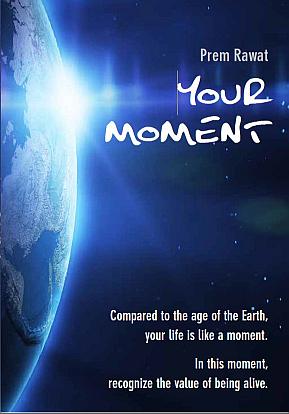 ADI #12, Your Moment
ADI #12, Your Moment
You have both possibilities. You have the possibility of being in a place where you entertain that one singular, most beautiful thought of gratitude, of fulfillment. Or you have the possibility of bewilderment. Bewilderment will not bring you gratification. Never has, never will. Knowing, feeling, experiencing will.
Don't get me wrong. I'm not talking about believing. I know there are believers, and I have news for the believers. Knowing is one grade up. If you are a believer, knowing encompasses believing. Yet believing does not necessarily encompass knowing. So do you know the one you? Do you?
Page 22

